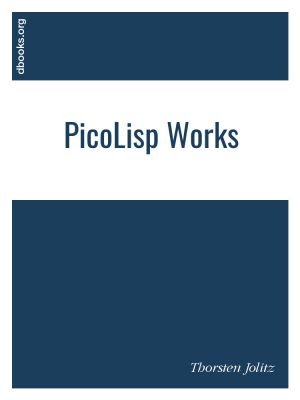PicoLisp Works
References, Tutorials, Articles, Essays
by Thorsten Jolitz
DescriptionTable of ContentsDetailsHashtagsReport an issue
Built on the unique characteristics of Lisp (almost no syntax, code is equivalent to data), PicoLisp combines powerful abstractions with simplicity and purity.
In a software world that is driven by hypes and desillusions, a language like PicoLisp almost appears as timeless as mathematics. With its roots in the very beginning of programming language development (Lisp was, together with Fortran, among the very first of its kind), PicoLisp may well represent the future too - as a candidate for being the "hundred-year language", that all programming languages finally converge into. 





Book Description
PicoLisp Works is a compilation of (almost) all available information about the technological gem PicoLisp - a programming language and environment that definitely deserves wider attention.Built on the unique characteristics of Lisp (almost no syntax, code is equivalent to data), PicoLisp combines powerful abstractions with simplicity and purity.
In a software world that is driven by hypes and desillusions, a language like PicoLisp almost appears as timeless as mathematics. With its roots in the very beginning of programming language development (Lisp was, together with Fortran, among the very first of its kind), PicoLisp may well represent the future too - as a candidate for being the "hundred-year language", that all programming languages finally converge into.
This open book is licensed under a GNU Free Documentation License (GNU FDL). You can download PicoLisp Works ebook for free in PDF format (1.9 MB).
Table of Contents
Chapter 1
A Radical Approach to Application Development
Chapter 2
A Unifying Language for Database And User Interface Development
Chapter 3
The PicoLisp Reference
Chapter 4
The Equivalence of Code and Data
Chapter 5
First Class Environments
Chapter 6
Even small details make a difference!
Chapter 7
The Dual Nature of NIL
Chapter 8
Array Abstinence
Chapter 9
Coroutines
Chapter 10
Transient Namespaces
Chapter 11
Native C Calls
Chapter 12
The 'select' Predicate
Chapter 13
Using 'edit'
Chapter 14
Bash Completion
Chapter 15
The Need for Speed
Chapter 16
GUI Scripting
Chapter 17
Manual Page
Chapter 18
README
Chapter 19
INSTALL
Chapter 20
A PicoLisp Tutorial
Chapter 21
PicoLisp Application Development
Chapter 22
VizReader's distributed word index
Chapter 23
Asynchronous Programming in PicoLisp
Chapter 24
PicoLisp Ticker
Chapter 25
The many uses of @ in PicoLisp
Chapter 26
Wacky Stuff with circular Lists
Chapter 27
Speedtest PicoLisp vs Elisp
Chapter 28
PicoLisp at first glance
Chapter 29
Registers and Quoting in PicoLisp
Chapter 30
Working with tables in PicoLisp
Chapter 31
Simple OO in PicoLisp
Chapter 32
More OO in PicoLisp
Chapter 33
Simple OODB in PicoLisp
Chapter 34
Advanced OODB in PicoLisp
Chapter 35
Registration Form in PicoLisp
Chapter 36
Explicit Scope Resolution in PicoLisp
Chapter 37
Pilog Solve and the +Aux Relation
Chapter 38
PicoLisp and JSON
Chapter 39
Factorials, Permutations and Recursion in PicoLisp
Chapter 40
Prolog as a Dating Aid
Chapter 41
jQuery and PicoLisp
Chapter 42
Frequently Asked Questions (FAQ)
Chapter 43
Some technical questions and answers
Chapter 44
README 64-bit
Chapter 45
Generic VM/Assembler
Chapter 46
Internal Structures 64-bit Version
Chapter 47
README Ersatz-PicoLisp
Chapter 48
Ersatz PicoLisp Java Reflection API
Book Details
Title
PicoLisp Works
Subject
Computer Science
Publisher
Self-publishing
Published
2012
Pages
467
Edition
1
Language
English
PDF Size
1.9 MB
License
GNU FDL
Related Books
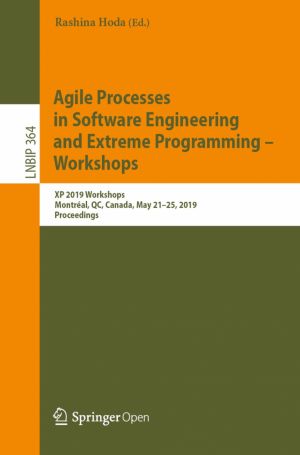
This book constitutes the research workshops, doctoral symposium and panel summaries presented at the 20th International Conference on Agile Software Development, XP 2019, held in Montreal, QC, Canada, in May 2019.XP is the premier agile software development conference combining research and practice. It is a hybrid forum where agile researchers, a...
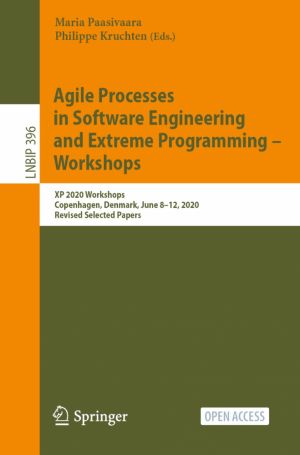
This open book constitutes the 6 research workshops, the Agile Education and Training Track, the Doctoral Symposium, as well as a panel presented at XP 2020, the 21st International Conference on Agile Software Development, which was held during June 8-12, 2020. The conference was planned to take place at the IT University of Copenhagen, Denmark. Du...
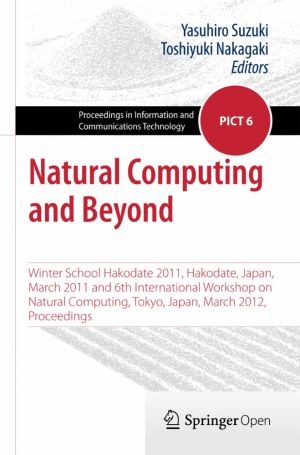
This book contains the joint proceedings of the Winter School of Hakodate (WSH) 2011 held in Hakodate, Japan, March 15–16, 2011, and the 6th International Workshop on Natural Computing (6th IWNC) held in Tokyo, Japan, March 28–30, 2012, organized by the Special Interest Group of Natural Computing (SIG-NAC), the Japanese Society for Artificial I...

The figures are eye-opening: more than 1.6 billion works on 9 million websites are licensed under Creative Commons (CC). These materials constitute an extraordinarily rich repository for teaching, learning, sharing, and creative reuse. Knowing your way around CC will help you make the most of the Open Access (OA) and open educational resources (OER...

The nineteenth century witnessed a series of revolutions in the production and circulation of images. From lithographs and engraved reproductions of paintings to daguerreotypes, stereoscopic views, and mass-produced sculptures, works of visual art became available in a wider range of media than ever before. But the circulation and reproduction of a...
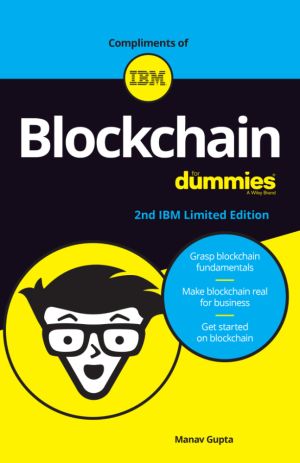
Blockchain For Dummies, 2nd IBM Limited Edition, equips you with an understanding of what blockchain is, how it works, and how it can enhance your business and the industry in which it operates. You learn the fundamentals of blockchain and how this technology revolutionizes transactions and business networks. You also discover the important differe...

